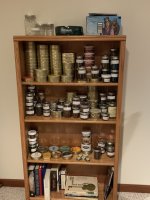Government regulations, STG, and a changing political and environmental climate. All of these things threaten pipe tobacco supplies, choices, varieties, and access. Australia, Canada, and New Zealand are basically already on the front lines feeling the impact of the changes being made to pipe tobacco access. But does this all mean doom and gloom?
For the less curious, the less ambitious, and the less persistent, maybe? But where many doors close, many more can open. I remember my law professor once asked me how I saw the law. I replied that I saw it as a set of stop signs that illuminated an infinite amount of spaces where no signs are posted. Opportunity will always present it to those who are in need and are... to quote Dumbledore, "worthy".
Tobacco will exist. Access to tobacco will exist. Procuring it may be be difficult, but it will exist.
Already, vast cellars of tobacco that can never be smoked by any one individual in any one life time exist. These micro warehouses will in time become distribution notes in and of themselves. The ability to home grow tobacco will eventually overtake the effort required to purchase it. Topping and casing kits will be sold to those who wish to home grow. The knowledge base necessary to grow, stove, cure, smoke, and prep tobacco for pipe smoking will become more accessible and will in time create a type of barter system shared among honorable smokers. The effort to bar the door will only create an inverse tidal force of resistance to break open the door.
We are not there now. Cellars will continue to grow - this is a relatively new behavior amongst pipe smokers. Entrepreneurs will watch, learn, and find ways to fill niches created when government regulators or Nordic revengers destroy the last major hold out producers. Long cherished blends will cease, but new ones, more innovative and creative will finally be given license to be created and accepted in the void that is created. In time, pipe smokers will someday laugh out trying to think that people in the past were left believing the best tobacco blends were made by professional tobacco blenders. The days of artisan blenders is before us, not behind us. Craft tobaccos will become sought after and new names will be added to the list of desirable blends.
The alternative. Cry, scream, boycott, stomp your feet. Get mad, get even, stop smoking. To what end will that get you? You and a cadre of others in the streets making noise, complaining, and threatening threats with loud voices. The night neither hears you or cares. But as for me..., I have enough to smoke a lifetime. If I need more, I have a patch of ground I can grow what I need. It isn't very big, but several plants a year will suffice. I can learn to sun cure, stove, and case, and top.
What are your plans?











